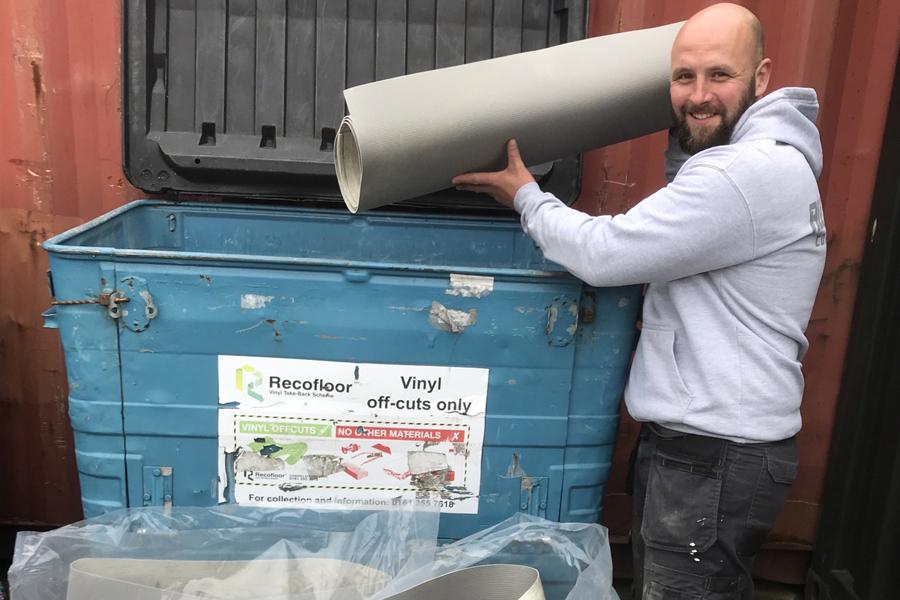DURABLE, robust and recyclable, PVC is a versatile material used in countless long-life and low-maintenance building products, from window frames to pipes and vinyl flooring. Given the existence of collection schemes and recycling infrastructure for the material, there’s no excuse for it to go to landfill.
PVC, or vinyl, is the most widely used polymer in building and construction applications with up to 70% of global annual PVC production used in this sector. Plastic products contribute to greater building energy efficiency, cost savings, construction safety, lower embodied carbon and design versatility.
First produced commercially in the late 1920s, this plastic quickly became popular for its flexible, durable and cost-effective qualities. Today, about 37m tonnes of PVC are produced worldwide, of which around 5.5m tonnes are made in Europe – making PVC Europe’s third most popular plastic.
Whether it’s rigid or flexible, PVC is used in a range of long-life applications with lifespans ranging from 30-100 years in construction products such as cables, pipes and window profiles. PVC products are also low-maintenance and can remain in use for a long time before they reach end-of-life.
In the flooring sector, PVC is used to make various types of vinyl flooring for the commercial and residential sectors, from rigid tile and plank formats to more flexible and semi-flexible options. Low-maintenance and easy to clean, vinyl flooring is a clear choice for sectors such as education, healthcare, hospitality and public buildings.
When it reaches its end-of-life, PVC can be recycled up to seven times without loss of performance. Recycled PVC can be reused in many diverse new products, such as windows, facias, electrical components, as well as flooring and traffic management products.
In recent decades there’s been significant investment in recycling technologies and infrastructure to recycle PVC, both in the UK and across Europe. In 2021, despite the contraction of economic activities caused by the Covid-19 pandemic, 810,775 tonnes of PVC waste were recycled through VinylPlus, the voluntary commitment to sustainable development of the European PVC industry.
The resilient flooring industry in Europe is represented by the European Resilient Flooring Manufacturers’ Institute. Recofloor co-founders Altro and Polyflor are ERFMI members. For PVC alone, ERFMI members recycled more than 130,000 tonnes in 2019.
ERFMI managing director Jane Gardner comments: ‘We and our members are very committed to working towards achieving a circular economy for our industry and that’s one of the cornerstones of our roadmap. We are working with the other signatories from across the plastics value chain to reach the goals laid down in the Circular Plastics Alliance.’
Revinylfloor is the circular economy platform for PVC flooring managed under the umbrella of ERFMI, which is working towards post-consumer technologies to tackle vinyl flooring waste. Revinylfloor has received co-funding from VinylPlus to help develop a more circular economy for PVC flooring and pursue research in the identification, sorting and recycling of PVC floorcoverings.
ERFMI is currently involved with several projects aligned with Circular Plastics Alliance principles, which are seeking solutions for legacy additives in vinyl flooring that present challenges for recycling post-consumer material.
ERFMI’s involvement includes contributing expertise to the EU project Circular Flooring, which is researching recycling end-of-life PVC floorcoverings using the Fraunhofer CreaSolv Process. The project runs until May 2023 and aims to assess the technical and commercial feasibility of this recycling process for PVC floorcoverings at an industrial scale.
Here in the UK, the Recofloor commercial waste vinyl flooring take-back scheme collects the vast majority of vinyl flooring for recycling.
Set up in 2009 by flooring manufacturers Altro and Polyflor, Recofloor has diverted a total of more than 6,300 tonnes of waste vinyl flooring from landfill. Recycling the material gives it a second life beyond the product’s first use, saving on raw material resources and recovering PVC for reuse, potentially for decades.
The scheme accepts luxury vinyl tiles (LVTs), smooth, safety and loose-lay vinyl offcuts, roll-ends and uplifted smooth vinyl. Recofloor-registered contractors can use the free drop-off locations or arrange collections directly from their premises or jobsite. This gives the flooring industry a sustainable and cost-saving route to dispose of waste vinyl flooring, avoiding landfill.
The material collected by Recofloor goes back to Polyflor and Altro for sorting. They recycle suitable material into new flooring, while unsuitable material is sent for recycling into long-life traffic management products, such as traffic cones and sign bases. This means used vinyl is given at least another 10 years’ life in durable products that can ultimately be recycled again.
Proud of Recofloor’s achievements and ongoing success, both manufacturers acknowledge the important role the scheme plays in their taking environmental responsibility for the materials they place on the market.
For specifiers working with vinyl flooring, Recofloor can help them achieve waste reduction targets and be part of the solution to keeping resources in the circular economy.
Participants can recycle specified commercial vinyl installation offcuts and uplifted smooth material through the scheme, thereby reducing recyclable material being sent to landfill.
Recofloor is easy to use, improves the sustainability of any vinyl flooring project, saves money on disposal costs and enhances your green credentials. PVC is recyclable, there should be no excuse for it to go to landfill.
0161 3557618
info@recofloor.org
www.recofloor.org
Please click to view more articles about
> Recofloor <

